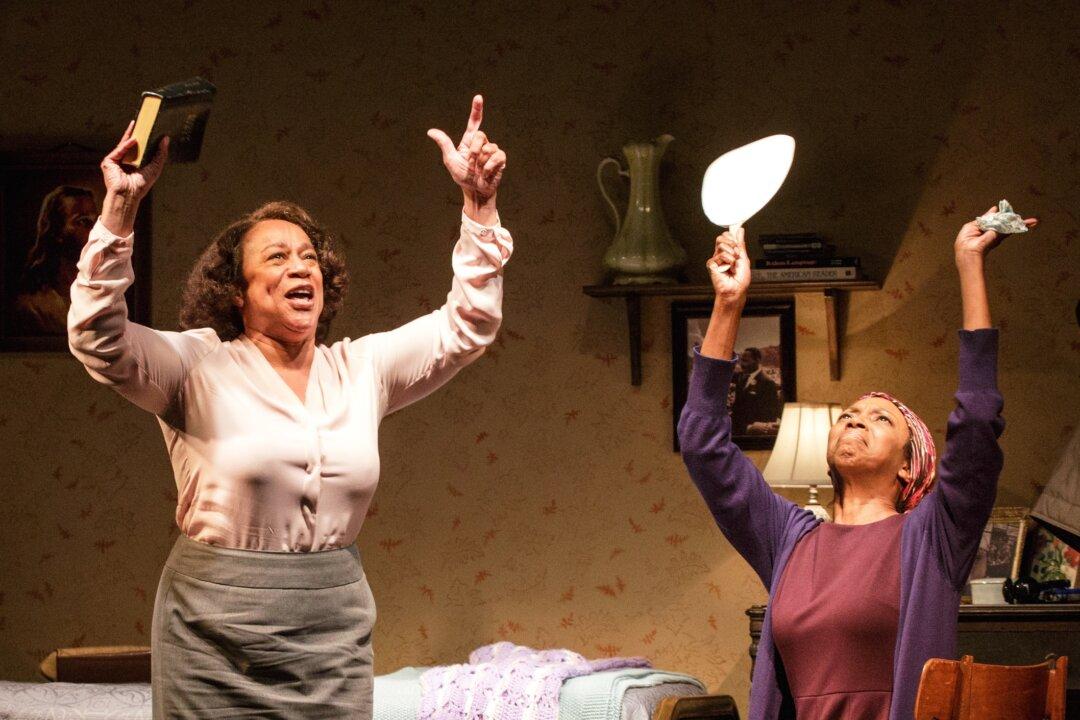NEW YORK—Coming to terms with the past is the message Billy Porter tries to impart in his play While I Yet Live, presented off-Broadway by Primary Stages. Sadly, Porter packs too much information into the story while sacrificing much needed depth to flesh out the characters and situations explored.
The story takes place in a two-story Pittsburgh dwelling (beautifully designed by James Noone), and home to several generations of family. Living there are Maxine (S. Epatha Merkerson), a woman who has suffered from a degenerative disability since birth, and her best friend Eva (Sharon Washington), who’s dying of cancer.
Also present are Maxine’s husband, Vernon (Kevyn Morrow), a man with a temper, and Calvin (Larry Powell), Maxine’s son from a previous relationship. Her daughter, Tonya (Sheria Irving), serves as the show’s narrator. Finally, there are Maxine’s sister, Delores (Elain Graham), and Maxine and Delores’s mom, Gertrude (Lillias White). There’s also a never seen uncle who lives in the room on the second floor.
It quickly becomes clear that many of the family carry secrets of shame, guilt, and anger. These conditions are due to events such as child abuse, infidelity, denial, and betrayal, all of which strain family relationships past the breaking point.
When pushed to that limit, Calvin bolts from his home as a matter of survival, which condemns his sister to the de facto role of caregiver of the family. As such, Calvin’s eventual return years later causes Tonya’s long-simmering resentment toward him to boil to the surface.
Her anger is especially strong now because she wants to go away to graduate school, and Calvin is unwilling to give up his new life in New York to take care of Maxine. He prefers instead to put her in a home, thus keeping her and their still unresolved issues at arm’s length.
Porter has crafted an interesting family drama with audience sympathies shifting constantly as different facts and situations become apparent. Unfortunately, he throws in so many crises and hidden secrets that it becomes a case of overkill.
This tendency becomes especially clear when certain matters, such as the issues of Maxine’s birth and the aforementioned uncle’s war trauma, are discarded almost as quickly as they are brought up.
Most importantly, we see Maxine both before her acceptance of various issues concerning her son and husband and afterward; however, we never see the actual awakening and transition that get her to that point.

(L–R) Vernon (Kevyn Morrow), a man with a temper, argues with his stepson, Calvin (Larry Powell). (James Leynse)
In fact, except for Delores and a conversation she has with the ghost/memory of her mother, the audience is almost never shown the transitional moments that allow the characters to change, thus weakening the overall effect.
An underlying message is the power of faith and the healing that comes with forgiveness. Maxine is devoted to God, and her steadfast belief allows her to keep going through all the years despite the massive amount of pain and suffering she’s experienced.
But in the finale, which is a confrontation between Maxine and her children, the religious angle is used to ignore everything that’s been set up in the previous 30-odd minutes regarding the future of these characters.
Also unanswered is the question of when does leaving your family, no matter how right the reason may have initially been, cease to be an issue of self-preservation and start to be one of selfishness?
Merkerson is brilliant as Maxine. She is pretty much the only person who substantially changes over the course of the show, at least while still alive. While Maxine must shoulder her share of the blame for some of the events depicted, Merkerson is able to make the character both appealing and interesting.
Irving is okay at Tonya, a young girl forced to grow up too fast, and ultimately bitter because of it. Irving also does well in depicting the aging of her character over the course of the play, thanks to some judicious costume changes and adjustments in posture and attitude.

Calvin (Larry Powell) tries to kiss his Aunt Delores (Elain Graham) while his grandmother, Gertrude (Lillias White) looks on. (James Leynse)
Powell doesn’t come off that well as Calvin. His performance is rather wooden, especially in his key early scenes.
Morrow projects a menacing air as Vernon. His early scenes are in sharp contrast to his later ones as a ghost/memory in Tonya and Calvin’s minds.
Washington gives a simple dignity to Eva, though it would have been nice to see Eva and Maxine’s relationship explored.
Sheryl Kaller’s direction is good, keeping the action moving nicely and the tension crackling, especially in the early part of the play. The transitions that show the passage of time and aging of the characters are also well-handled.
“While I Yet Live” has a lot of interesting ideas and characters. Though with so many crises and hints of information tossed into the mix, what ultimately comes forth is more disjointed than coherent.
‘While I Yet Live’
The Duke at 42nd Street
229 West 42nd St.
Tickets: 646-223-3010, PrimaryStages.org, or DukeOn42.org
Running Time: 2 hours, 15 minutes
Closes: Oct. 31
Judd Hollander is the New York correspondent for the London publication The Stage.





